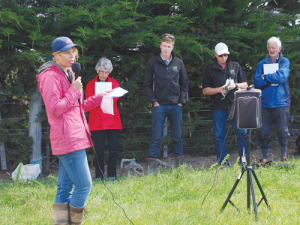Double Standard
OPINION: The proverbial has really hit the fan in Wellington and exposed a glaring example of a double standard in environmental accountability.
 South Canterbury farmer and Irrigation NZ chair Nicky Hyslop discusses the benefits of irrigation to Grasslands Conference-goers at a field day on her South Canterbury property.
South Canterbury farmer and Irrigation NZ chair Nicky Hyslop discusses the benefits of irrigation to Grasslands Conference-goers at a field day on her South Canterbury property.
The Opuha Dam irrigation project is bringing $126 million annually into the South Canterbury region, says local farmer Nicky Hyslop.
Hyslop, who is the chair of Irrigation New Zealand, and her husband Jonty, farm the 227ha Levels Estate, a few km northwest of Timaru, where they hosted a field trip visit by attendees of the annual Grassland Association conference.
One of the first farms in the district to get border dyke irrigation, the farm now has 208ha irrigated, mainly with two centre pivots and a long linear irrigator along the main road frontage.
The Hyslops trade lambs and cattle including dairy heifers, grow up to 20ha of spring feed barley and 4ha of specialist seed crops, and lease 20ha to a potato grower.
Emphasising the diversity and vitality irrigation has brought to the district, Hyslop says the local school had only 200 pupils when they moved in in 2003, but now has 300.
Under border dyke irrigation, pre-Opuha, the farm produced 280kg carcase weight/ha and 280 tonnes of grain, for a gross income of $1683/ha, and supported one family.
Post-Opuha, between 2013 and 2015, and even with the severe restrictions imposed by drought in the latter part of the period, it recorded 740kgCW/ha, 400t of grain and a gross income of $3976/ha.
It is now supporting two families, with five pre-school and school-age children, she says.
Guest speaker during the visit to the Hyslop farm was Craige Mackenzie, a Methven dairy and cropping farmer and founder of the precision agriculture company Agri-Optics.
He advocates electro-magnetic mapping of farms to understand their underlying soil characteristics, continued monitoring with technology such as soil moisture probes, and using spatial application of fertilisers and irrigation to maximise efficiency.
“Every individual sprinkler down those irrigators is individually controlled. Then depending on the sprinkler spacing, and how intense your soil changes are, you can control that – if you’ve got probes in each zone – down to each individual dropper.”
Mackenzie says that even on non-irrigated land, monitoring soil moisture allows farmers to decide when to destock.
Budou are being picked now in Bridge Pā, the most intense and exciting time of the year for the Greencollar team – and the harvest of the finest eating grapes is weeks earlier than expected.
The Real Estate Institute of New Zealand (REINZ) has released its latest rural property report, providing a detailed view of New Zealand’s rural real estate market for the 12 months ending December 2025.
Rural retailer Farmlands has released it's latest round of half-year results, labeling it as evidence that its five-year strategy is delivering on financial performance and better value for members.
OPINION: "We are back to where we were a year ago," according to a leading banking analyst in the UK, referring to US president Donald Trump's latest imposition of a global 10% tariff on all exports into the US.
DairyNZ says the Government’s proposed Resource Management Act reform needs further work to ensure it delivers on its intent.
Overseas Trade Minister Todd McClay says he's working constructively with the Labour Party in the hope they will endorse the free trade agreement (FTA) with India when the agreement comes before Parliament for ratification.

OPINION: A mate of yours truly reckons rural Manawatu families are the latest to suffer under what he calls the…
OPINION: If old Winston Peters thinks building trade relations with new nations, such as India, isn't a necessary investment in…